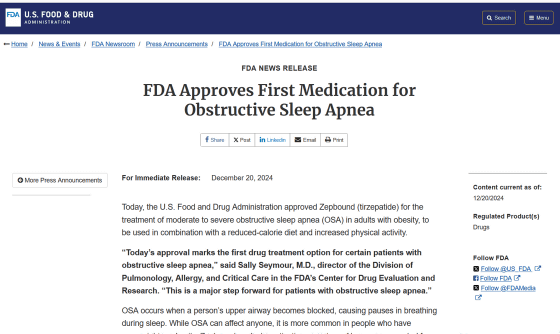FDA first to approve obesity drug tirzepatide for treatment of sleep apnea

FDA Approves First Medication for Obstructive Sleep Apnea | FDA
https://www.fda.gov/news-events/press-announcements/fda-approves-first-medication-obstructive-sleep-apnea

The FDA Just Approved The First US Drug Treatment For Sleep Apnea : ScienceAlert
https://www.sciencealert.com/the-fda-just-approved-the-first-us-drug-treatment-for-sleep-apnea
Obstructive sleep apnea syndrome is a condition in which breathing slows or stops during sleep, and is said to be associated with an increased risk of high blood pressure, stroke, and depression. Although anyone can develop the condition, it is known that the incidence rate is higher in overweight and obese people, and in particular, about 12% of adults in the United States suffer from obstructive sleep apnea syndrome.
On December 20, 2024, the FDA announced that it would approve tirzepatide as a treatment for moderate to severe obstructive sleep apnea in obese adults. Tirzepatide is a drug developed by Eli Lilly , an American pharmaceutical company, that activates receptors for two hormones secreted from the intestine , glucagon-like peptide-1 (GLP-1) and glucose-dependent insulinotropic polypeptide (GIP) , reducing patients' appetite and food intake.
Tirzepatide is already being used as a treatment for type 2 diabetes and obesity , under the names 'Manjaro' for type 2 diabetes and 'Zepbound' for obesity.

The FDA's approval of tirzepatide for the treatment of obstructive sleep apnea is based on a randomized, double-blind, placebo-controlled study in 469 adults without type 2 diabetes, in which patients with moderate to severe obstructive sleep apnea were randomly assigned to receive either tirzepatide or a placebo once weekly for 52 weeks.
The results of the study showed that
'Today's approval provides the first medication option for certain patients with obstructive sleep apnea,' said Dr. Sally Seymour, director of the Division of Respiratory, Allergy and Critical Care in the FDA's Center for Drug Evaluation and Research. 'This is a major step forward for people with obstructive sleep apnea.'
In addition, tirzepatide may cause side effects such as nausea, diarrhea, stomach discomfort, and allergic reactions, as well as serious side effects such as pancreatitis, hypoglycemia, and suicidal thoughts. Therefore, patients should consider taking it on the advice of their doctor, and medical professionals should also monitor patients.

Related Posts:
in Science, Posted by log1h_ik







